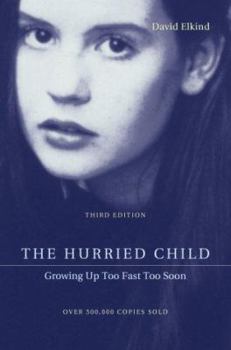The Hurried Child: Growing Up Too Fast Too Soon
Select Format
Select Condition 
Book Overview
"David Elkind [is] one of psychology's leading lights."--Washington Post With the first edition of The Hurried Child, David Elkind emerged as the voice of parenting reason, calling our attention to... This description may be from another edition of this product.
Format:Paperback
Language:English
ISBN:0738204412
ISBN13:9780738204413
Release Date:April 2001
Publisher:Da Capo Lifelong Books
Length:244 Pages
Weight:0.70 lbs.
Dimensions:0.8" x 5.4" x 8.2"
Customer Reviews
5 ratings
Keen Insite
Published by Thriftbooks.com User , 19 years ago
Elkind shows a keen insite into the brain of youth. A must read for parents concerned about the progress of their child.
The Hurried Child by Elkind
Published by Thriftbooks.com User , 20 years ago
The author cautions against rushing life for young peopleand placing too many artificial pressures on them. Thesepressures come in the form of standardized tests, overschedulingand excessive concentration on child competence issues insteadof allowing young people to mature. Children are in essenceminiature adults. In addition, the author cautions againstassembly-line learning. Type A competitive children grow intoadults with more cholesterol in the blood than normal.On international comparison tests, American students tend toachieve lower scores despite all the pressure to do well.Only 1/5 of 17 year olds can write a persuasive essay.Clearly, the author has some important points to make.The readers should heed this advice and apply it accordingly.There is a need for balance in life. In this respect, the authorhas some important points to teach college administrators andparents. A wide constituency of educators needs to read thisbook dispassionately and apply it for the benefit of students.
Classic Case for Untouched Societal Issue
Published by Thriftbooks.com User , 23 years ago
Always can't wait to be something we aren't now. Remember grade school? Couldn't wait for junior high? Then, once there, couldn't wait for High School? Then College? Then the real world, and all that brings, own house, car, etc.Those that have been through this now know on the other side how it's not all that it's cut out to be. However, the problem truly is that today this coveting to grow up faster is much accelerated from previous generations.Our liberal, sensuous, consumer based culture has pushed this down to the grade schools. The picture to me tells it all, the small girl who trys to look like twenty. Eland helps by giving the data and analyzing it as well as suggesting ways we all can contribute to letting our kids be kids for as long as we can.
Every parent should read this book!
Published by Thriftbooks.com User , 24 years ago
This book is a great resource for parents and teachers. As an aunt, godmother, teacher and friend to many children of all ages, I turn to this book often. If you believe that children deserve a childhood, then this book is for you.
Informative
Published by Thriftbooks.com User , 25 years ago
"The Hurried Child"by David Elkind gives concrete examples of some of the emotional,intellectual and social consequences of hurrying a child's development by both parent and teachers. Children today are under an enormous amount of pressure to act, dress and assume adult roles and responsibilities. This hurrying causes stress in very young children as well as adolescents. I think the book addresses a lot of issues that have negative impact on all children. I learned a great deal about what constitutes hurrying in young children. The author brings forth the fact that hurrying takes place in both the home and school settings. Children are pushed to read earlier than they are developmentally ready; do math and behave in ways that most theorists like Erikson and Piaget have shown to be in direct conflict with children's cognitive and emotional development. The book was excellent in demonstrating the impact of outside influences such as T.V, movies,records and the media on children's development. The achievements and limitations of the major stages of development were long recognised by Piaget on cognitive development and by Erikson on emotional development. The book emphasized that when children's needs become subordinate to parental needs their emotional as well as cognitive growth is affected. I recommend that anyone who gets a chance to read this book does so, especially parents and educators of young children. Agnes.






